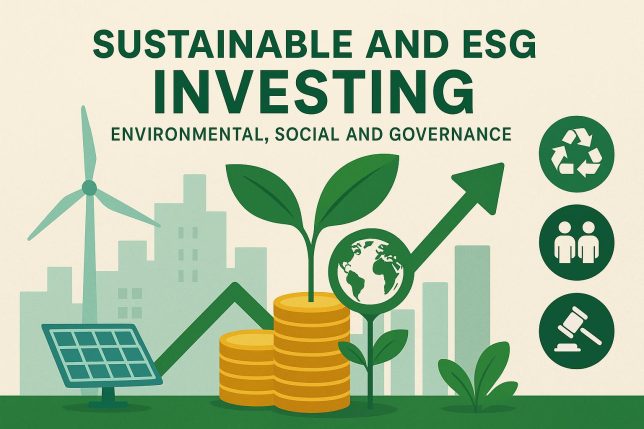Understanding Sustainable and ESG Investing
The concept of sustainable and ESG investing has become a pivotal area of focus in contemporary finance. This investment strategy emphasizes integrating environmental, social, and governance (ESG) criteria into financial decision-making, aligning investment portfolios with broader ethical and societal goals. As individuals and institutions become more conscious of the environmental and social implications of their choices, sustainable investing emerges as both a financial and a moral imperative.
What is ESG Investing?
ESG investing evaluates companies based on three essential criteria: environmental, social, and governance factors. These factors provide a framework for assessing how a company manages its responsibilities to the planet, society, and its stakeholders.
Environmental: The environmental dimension of ESG focuses on how a company interacts with the natural world. Critical aspects include resource management, pollution control, carbon footprint reduction, and investing in sustainability initiatives. Companies are scrutinized on their ability to minimize environmental impact and contribute positively to ecological preservation.
Social: The social component examines how businesses manage relationships with their employees, customers, suppliers, and broader communities. Essential considerations include labor conditions, community engagement, and respect for human rights. This dimension emphasizes corporate responsibility in fostering fair and equitable workplaces and contributing to social welfare.
Governance: Governance pertains to the internal systems and processes that dictate how a company is led and managed. This includes evaluating the board of directors’ structure, executive pay, shareholder rights, and the transparency and integrity of financial reporting. Proper governance is crucial for ensuring accountability, fostering trust, and safeguarding shareholder interests.
The Rise of ESG Investing
Several catalysts have contributed to the meteoric rise of ESG investing. Prominent among them is the growing awareness and urgency surrounding climate change and environmental preservation. As evidence mounts on the profound consequences of climate change, investors increasingly prioritize companies that are proactive in addressing these issues.
Moreover, there is a heightened demand from consumers and stakeholders for corporate accountability. In an era where transparency and ethical business practices are valued, firms are encouraged to align with socially responsible operational standards.
Financially, there is a compelling argument for ESG investing. Research illustrates that businesses with robust ESG protocols often outperform their peers over the long term. The rationale is that such companies are better equipped to navigate regulatory challenges, adapt to societal shifts, and mitigate risks, thereby ensuring sustained profitability.
Global regulatory bodies are also playing a significant role by implementing more stringent ESG disclosure norms. These regulations compel companies to enhance their sustainability reporting, creating an environment where transparency and accountability are paramount. Concurrently, financial institutions are responding to investor demand by developing ESG-centric investment products, providing avenues to invest in accordance with one’s values.
Benefits of ESG Investing
Adopting an ESG investment strategy offers a plethora of potential benefits:
Risk Management: ESG analysis allows investors to identify companies potentially exposed to environmental penalties, social unrest, or governance-related discrepancies. By excluding or underweighting such firms, investors can effectively manage and mitigate potential risks in their portfolios.
Value Creation: Commitment to sustainable practices often results in enhanced brand perception, increased customer loyalty, and operational efficiencies. Collectively, these factors contribute to long-term value creation, driving superior financial performance.
Positive Impact: ESG investing empowers investors to make a tangible difference by allocating capital towards companies committed to ethical and sustainable business practices. This fosters a more sustainable global economy and underscores investors’ role in advocating for positive societal change.
Challenges in ESG Investing
Despite its merits, ESG investing is not without its challenges. One of the most pronounced issues is the lack of uniformity in ESG metrics and reporting standards. The absence of standardized criteria complicates the process of evaluating and comparing companies, making it difficult for investors to make informed choices.
Additionally, the phenomenon of “greenwashing” remains a concern. Some companies may exaggerate or falsely present their sustainability achievements to appeal to ESG-conscious investors, despite having minimal genuine commitment to sustainable practices. It’s imperative for investors to exercise due diligence and leverage comprehensive research to discern the authenticity of a company’s ESG claims.
The path to overcoming these challenges lies in ongoing dialogue and collaboration among investors, companies, regulators, and other stakeholders. By working collectively towards standardized metrics and enhanced transparency, the investment community can better harness the potential of sustainable investing to drive meaningful change.
For those seeking to deepen their understanding of ESG investing, several reputable resources are available, including insights and guidelines from major financial institutions and non-governmental organizations dedicated to sustainable finance. These platforms provide valuable information on emerging trends, best practices, and regulatory developments in the ESG landscape.
Consistently staying informed about the latest developments in the ESG domain is crucial for investors intent on integrating these considerations into their investment strategies. Resources like MSCI and The Principles for Responsible Investment offer comprehensive insights and updates, supporting the informed decision-making process.
In conclusion, sustainable and ESG investing represents more than just a transient trend; it signifies a paradigm shift in how investment decisions are made. By aligning financial pursuits with ethical and sustainable objectives, investors can contribute to a better future while achieving their economic goals. As the ESG framework continues to evolve, its integration into mainstream investing ensures that considerations for the planet and society are intrinsically woven into the financial fabric.
This article was last updated on: September 14, 2025

